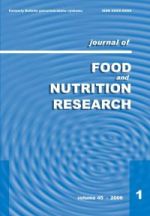Vedecký časopis - archív
Journal of Food and Nutrition Research
Súhrny čísla 4 / 2013
Komprda, T. – Sládková, P. – Kolářová, M. – Zorníková, G. – Sládek, Z. – Rožnovská, D.
Effect of probiotic and symbiotic yoghurt consumption on counts of human faecal bacteria and tyramine production
Journal of Food and Nutrition Research, 52, 2013, č. 4, s. 230-238
Tomáš Komprda, Department of Food Technology; Mendel University in Brno, Zemědělská 1, 613 00 Brno, Czech Republic. E-mail: komprda@mendelu.cz; tel.: +420 545 133 261; fax: +420 545 133 190
Súhrn: The purpose of the study was to compare the impact of consumption of yoghurt enriched with Bifidobacterium animalis + Lactobacillus acidophilus (P), and yoghurt containing the same strains + inulin (S), on counts of faecal bacteria in healthy subjects. A randomized, parallel-group, crossover, open-label intervention with 66 volunteers was carried out. The three-week administration of both P and S yoghurt increased (p < 0.01) counts of bifidobacteria and L. acidophilus, and decreased (p < 0.01) counts of clostridia, enterococci and E. coli in faeces, in comparison with the control diet. Moreover, consumption of both P- and S-yoghurt decreased (p < 0.05) the counts of tyramine-producing enterococci and E. coli among the faecal isolates. In the S-group, counts of bifidobacteria and L. acidophilus remained higher, and counts of clostridia, enterococci and E. coli lower (p < 0.05) after one-week wash-out period, in comparison with the pre-administration phase. It was concluded that the S-yoghurt was superior to the P-product in maintaining the increased levels of beneficial bacteria and decreased counts of potentially deleterious bacteria in the intestine.
Kľúčové slová: Bifidobacterium animalis; faecal bacteria; inulin; Lactobacillus acidophilus; tyramine; yoghurt
Na stiahnutie:
jfnr20134p_4.pdf (PDF, 132.88 Kb, 1723x)










